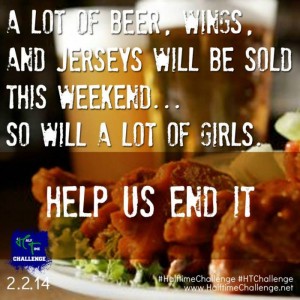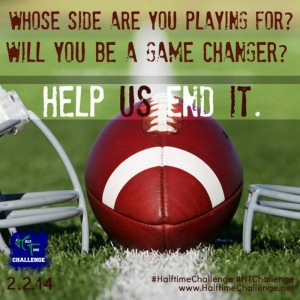By Caroline Miller, graduate student at Columbia University’s School of International and Political Affairs & Mailman School of Public Health
_____________________________________________________________________________
Super Bowl Sunday is right around the corner. It’s time for the annual gathering of family and friends to eat large quantities of junk food, watch captivating television commercials, and cheer on the two best NFL teams as they face off. So what does human trafficking have to do with this festive football day? It turns out that the Super Bowl has a dark side associated with a high prevalence of human trafficking activities. And this year, it will be right in our backyard, across the river in East Rutherford, New Jersey (NJ).
With the influx of thousands of people to the host city, experts contend that the number of men looking to pay for sex surges and the immense crowds associated with the game make victims fall under the radar.[1] Sex workers are brought in to meet the demand of fans willing to engage in the illegal behavior. For example, 10,000 prostitutes were brought to the Miami area for the 2010 Super Bowl.[2] Additionally, the labor trafficking industry brings in domestic workers to places such as nail salons.[3] These patterns have led some to refer to the Super Bowl as a “hub”[4] for human trafficking. But is this the case?
Several prominent trafficking advocates challenge the connection between the Super Bowl and a higher prevalence of human trafficking. They believe human trafficking is a broader issue that cannot be simplified into a Super Bowl storyline. Bradley Myles, the CEO of the Polaris Project, a leading organization on the front lines of fighting trafficking globally and in the U.S., says that “there’s not an enormous amount of data that tells the story that there’s a giant spike in trafficking around the Super Bowl.”[5] The national human trafficking hotline, supported by the Polaris Project, did not experience a significantly higher rate of calls during the past few Super Bowls. Miles emphasizes that trafficking is an issue that plagues individuals every day of the year and encourages advocates to focus on the issue beyond the football weekend. When the lights and cameras leave after the Super Bowl, the victims are left suffering without any greater chance of change in their lives.
Despite the questionable evidence concerning Super Bowl trafficking prevalence, state lawmakers have typically taken action to address trafficking in advance of hosting the game. In the run up to the 2011 Dallas Super Bowl, Texas Attorney General Greg Abbott stated that “the Super Bowl is the single largest trafficking incident in the U.S.”[6] and consequently launched undercover investigations in the region to detect trafficking rings. Likewise, in Indiana in 2012, lawmakers passed tough trafficking legislation right before the Super Bowl that made it illegal for “anybody to arrange for a person to participate in any forced sexual act.”[7] These stories capture the attention of the media and public year after year.
It is no surprise that we are now seeing a similar story unraveling in New Jersey for the 2014 Super Bowl. The NJ Coalition Against Human Trafficking is working in coordination with the N.J. Attorney General’s Office to mobilize the public. Event and airport security, hotel managers, and local taxi drivers are being trained in advance on ways to detect and handle trafficking situations. In 2013, N.J. passed new legislation making it one of the strongest states in the country in the fight against trafficking. The new law increased the penalty for trafficking and established funds to train law enforcement and educate the community before the big event.[8]
So, are the media and certain trafficking organizations propagating a virtuous or vicious cycle? One the one hand, they are potentially doing more harm than good by focusing the public’s attention on combating human trafficking at one exclusive event instead of on more sustained efforts that will have long-term effects on at-risk populations. They must be careful not to misrepresent the issue by conveying to the general public that the U.S. trafficking industry can be squashed through easy fixes, such as greater security measures at the annual Super Bowl game.
On the other hand, lawmakers and advocacy organizations repeatedly seem to be using the Super Bowl as a political window to enact tougher trafficking legislation. The Super Bowl has proven to play a critical role in encouraging states to reflect inward on their own laws concerning trafficking and has given local trafficking advocates a platform to raise awareness in their communities. The campaigns focused on the high prevalence of trafficking at the Super Bowl may simplify the complexities of the issue, but they also create a launching point for more sustainable change, through state legislation, community education initiatives, and greater public engagement.
Furthermore, many people associate trafficking as an international issue, but don’t realize that it is a human rights violation that permeates U.S. boundaries. It is a “modern form of slavery”[9] that is often shielded from the public eye. The U.S. ranks as the second highest country in the world for trafficking women, with an estimated 18,000 foreign nationals being trafficked into the country each year. Additionally, 300,000 American-born children are at risk of sexual exploitation.[10] The American public could benefit from a large dose of awareness initiatives on the prevalence of trafficking in this country. The campaigns around the Super Bowl offer an opportunity to shine a light on the plight of trafficked victims in the U.S.
We can applaud N.J. for its efforts to engage the public. Take a look at the Halftime Challenge led by the N.J. Coalition Against Human Trafficking. It uses social media as a platform to spread the word about trafficking in the weeks leading up to the Super Bowl.
Perhaps, when you put out the chips and salsa and turn on the television on Super Bowl Sunday, consider tweeting about trafficking with #HalftimeChallenge or even printing out a flyer with trafficking statistics to share with your family and friends.
Caroline Miller is a first year graduate student pursuing a dual MPA-MPH at Columbia’s School of International and Public Affairs and Mailman School of Public Health. Her interests include issues relating to gender equity, sexual and reproductive rights, gender-based violence, social justice and philanthropy.
[3]http://www.northjersey.com/news/240415691_Officials_plan_for_Super_Bowl_sex_trafficking.html?c=y&page=1http://www.northjersey.com/news/240415691_Officials_plan_for_Super_Bowl_sex_trafficking.html?c=y&page=1


